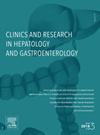Trends in food protein-induced allergic proctocolitis (FPIAP): Mechanisms and treatment targeting gut microbiome
IF 2.4
4区 医学
Q2 GASTROENTEROLOGY & HEPATOLOGY
Clinics and research in hepatology and gastroenterology
Pub Date : 2025-06-06
DOI:10.1016/j.clinre.2025.102634
引用次数: 0
Abstract
Background
Food protein-induced allergic proctocolitis (FPIAP) is a non-IgE-mediated food allergy characterized by subacute or chronic inflammatory processes in the gut. Unlike IgE-mediated food allergies that may cause multi-organ syndromes, non-IgE-mediated food allergies mainly affect the gastrointestinal tract. The incidence of FPIAP is rising globally, becoming a significant health concern.
Objectives
This article aims to systematically review the epidemiological characteristics, pathogenesis, cell death programs involved in FPIAP, and its relationship with the gut microbiota. It also explores therapeutic developments targeting the intestinal microbiota.
Methods
We conducted a comprehensive literature search across multiple databases, including PubMed, Web of Science, and Scopus, up to December 2024. Studies were selected based on predefined inclusion and exclusion criteria. Data extraction and quality assessment were performed by two independent reviewers.
Results
The review identified key epidemiological trends, highlighting the increasing incidence of FPIAP. The pathogenesis section elucidates the mechanisms underlying non-IgE-mediated allergies, emphasizing the role of the gut microbiome in mediating dietary factors and immune responses. Specific cell death programs, such as apoptosis and pyroptosis, were found to be involved in the progression of FPIAP. Therapeutic strategies targeting the gut microbiota show promise in managing FPIAP, with probiotics and prebiotics emerging as potential interventions.
Conclusions
This review provides valuable insights into the mechanisms of FPIAP and highlights the potential of microbiota-targeted therapies. Future research should focus on large-scale clinical trials to validate the efficacy of these interventions and further explore the complex interplay between diet, gut microbiota, and immune responses in FPIAP.
食物蛋白诱导的过敏性直结肠炎(FPIAP)的趋势:机制和针对肠道微生物组的治疗。
背景:食物蛋白诱导的过敏性直结肠炎(FPIAP)是一种非ige介导的以肠道亚急性或慢性炎症过程为特征的食物过敏。与可能引起多器官综合征的ige介导的食物过敏不同,非ige介导的食物过敏主要影响胃肠道。FPIAP的发病率正在全球上升,成为一个重大的健康问题。目的:本文旨在系统综述FPIAP的流行病学特征、发病机制、细胞死亡程序及其与肠道菌群的关系。它还探讨了针对肠道微生物群的治疗发展。方法:我们对PubMed、Web of Science、Scopus等多个数据库进行了全面的文献检索,检索时间截止到2024年12月。根据预先确定的纳入和排除标准选择研究。数据提取和质量评估由两名独立评审员进行。结果:该综述确定了主要的流行病学趋势,强调了FPIAP发病率的增加。发病机制部分阐明了非ige介导的过敏机制,强调了肠道微生物群在介导饮食因素和免疫反应中的作用。特定的细胞死亡程序,如凋亡和焦亡,被发现参与FPIAP的进展。针对肠道微生物群的治疗策略显示出治疗FPIAP的希望,益生菌和益生元成为潜在的干预措施。结论:这篇综述为FPIAP的机制提供了有价值的见解,并强调了微生物群靶向治疗的潜力。未来的研究应集中在大规模的临床试验上,以验证这些干预措施的有效性,并进一步探索饮食、肠道微生物群和FPIAP免疫反应之间的复杂相互作用。
本文章由计算机程序翻译,如有差异,请以英文原文为准。
求助全文
约1分钟内获得全文
求助全文
来源期刊

Clinics and research in hepatology and gastroenterology
GASTROENTEROLOGY & HEPATOLOGY-
CiteScore
4.30
自引率
3.70%
发文量
198
审稿时长
42 days
期刊介绍:
Clinics and Research in Hepatology and Gastroenterology publishes high-quality original research papers in the field of hepatology and gastroenterology. The editors put the accent on rapid communication of new research and clinical developments and so called "hot topic" issues. Following a clear Editorial line, besides original articles and case reports, each issue features editorials, commentaries and reviews. The journal encourages research and discussion between all those involved in the specialty on an international level. All articles are peer reviewed by international experts, the articles in press are online and indexed in the international databases (Current Contents, Pubmed, Scopus, Science Direct).
Clinics and Research in Hepatology and Gastroenterology is a subscription journal (with optional open access), which allows you to publish your research without any cost to you (unless you proactively chose the open access option). Your article will be available to all researchers around the globe whose institution has a subscription to the journal.
 求助内容:
求助内容: 应助结果提醒方式:
应助结果提醒方式:


